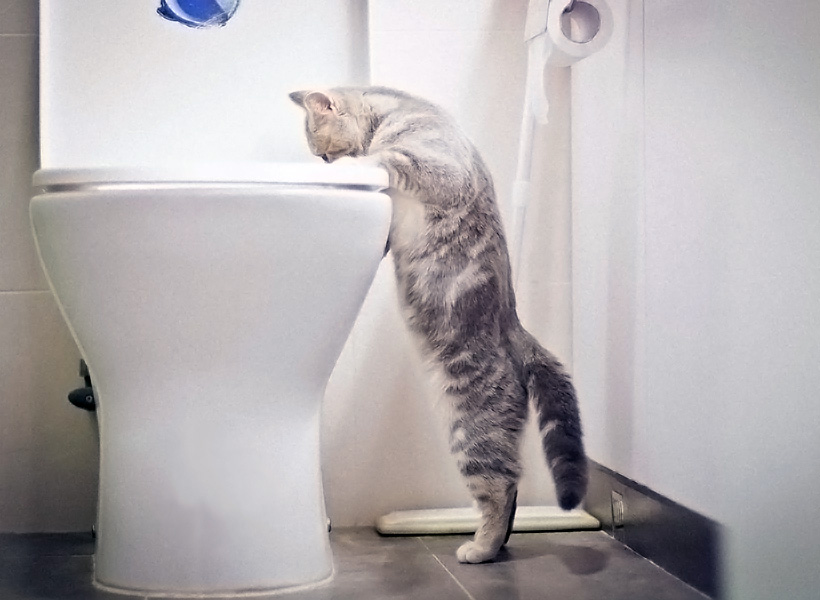Don't Flush Cat Poop Down Your Toilet - Maintain Your House's Pipe Integrity
Don't Flush Cat Poop Down Your Toilet - Maintain Your House's Pipe Integrity
Blog Article
This post in the next paragraphs pertaining to How to Dispose of Cat Poop and Litter Without Plastic Bags is absolutely fascinating. Don't miss out on it.

Intro
As feline proprietors, it's vital to bear in mind exactly how we dispose of our feline good friends' waste. While it may seem hassle-free to purge feline poop down the commode, this practice can have detrimental consequences for both the setting and human wellness.
Ecological Impact
Flushing cat poop introduces hazardous pathogens and bloodsuckers right into the water supply, posing a substantial risk to marine communities. These impurities can negatively influence marine life and compromise water top quality.
Health and wellness Risks
In addition to ecological problems, flushing pet cat waste can also pose health and wellness risks to humans. Feline feces might contain Toxoplasma gondii, a parasite that can create toxoplasmosis-- a potentially extreme disease, particularly for pregnant women and people with damaged immune systems.
Alternatives to Flushing
Fortunately, there are much safer and a lot more liable methods to throw away cat poop. Think about the adhering to alternatives:
1. Scoop and Dispose in Trash
One of the most usual technique of dealing with cat poop is to scoop it right into a biodegradable bag and throw it in the trash. Be sure to use a dedicated trash inside story and throw away the waste without delay.
2. Usage Biodegradable Litter
Go with biodegradable pet cat trash made from products such as corn or wheat. These clutters are eco-friendly and can be safely dealt with in the trash.
3. Hide in the Yard
If you have a lawn, take into consideration burying cat waste in a marked area away from veggie yards and water resources. Make sure to dig deep sufficient to prevent contamination of groundwater.
4. Mount a Pet Waste Disposal System
Buy a pet dog garbage disposal system particularly created for feline waste. These systems utilize enzymes to break down the waste, lowering odor and environmental impact.
Final thought
Liable pet dog ownership prolongs beyond giving food and sanctuary-- it likewise includes appropriate waste management. By avoiding flushing pet cat poop down the commode and opting for alternative disposal techniques, we can decrease our environmental impact and shield human wellness.
Why You Should Never Flush Cat Poop Down the Toilet
A rose by any other name might smell as sweet, but not all poop is created equal. Toilets, and our sewage systems, are designed for human excrement, not animal waste. It might seem like it couldn’t hurt to toss cat feces into the loo, but it’s not a good idea to flush cat poop in the toilet.
First and foremost, assuming your cat uses a litter box, any waste is going to have litter on it. And even the smallest amount of litter can wreak havoc on plumbing.
Over time, small amounts build up, filling up your septic system. Most litter sold today is clumping; it is made from a type of clay that hardens when it gets wet. Ever tried to scrape old clumps from the bottom of a litter box? You know just how cement-hard it can get!
Now imagine just a small clump of that stuck in your pipes. A simple de-clogger like Drano isn’t going to cut it. And that means it’s going to cost you big time to fix it.
Parasitic Contamination
Believe it or not, your healthy kitty may be harboring a nasty parasite. Only cats excrete Toxoplasma in their feces. Yet it rarely causes serious health issues in the cats that are infected. Most people will be fine too if infected. Only pregnant women and people with compromised immune systems are at risk. (If you’ve ever heard how women who are expecting are excused from litter cleaning duty, Toxoplasma is why.)
But other animals may have a problem if infected with the parasite. And human water treatment systems aren’t designed to handle it. As a result, the systems don’t remove the parasite before discharging wastewater into local waterways. Fish, shellfish, and other marine life — otters in particular — are susceptible to toxoplasma. If exposed, most will end up with brain damage and many will die.
Depending on the species of fish, they may end up on someone’s fish hook and, ultimately on someone’s dinner plate. If that someone has a chronic illness, they’re at risk.
Skip the Toilet Training
We know there are folks out there who like to toilet train their cats. And we give them props, it takes a lot of work. But thanks to the toxoplasma, it’s not a good idea.

As an enthusiastic person who reads on Can You Flush Cat Poo or Litter Down the Toilet?, I thought sharing that piece of content was important. Do you know about anybody else who is serious about the topic? Why not share it. Many thanks for going through it.
Hire A Pro Report this page